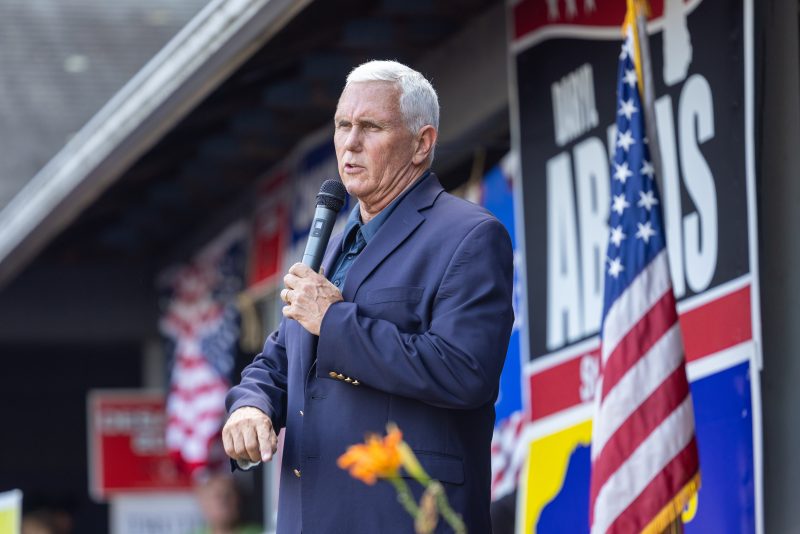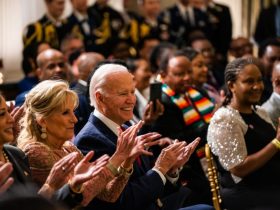Former vice president Mike Pence on Wednesday delivered a sharp rebuke of his former governing partner’s guiding philosophy, arguing that Donald Trump — who maintains a commanding polling lead over other Republican White House hopefuls — no longer hews to conservatism and has instead adopted the tone of a populist.
Pence, in a speech at St. Anselm College’s New Hampshire Institute of Politics, argued that conservatism is incompatible with the kind of populism espoused by Trump and candidates who seek to emulate him, according to prepared remarks distributed by Pence’s campaign.
In the remarks, Pence said that he and Trump governed from the White House as conservatives but that the former president makes no such promises about the future.
“Donald Trump, along with his populist followers and imitators — some of whom are also seeking the Republican presidential nomination — often sound like an echo of the progressive they would replace in the White House,” Pence planned to say.
Pence also argues that the GOP should be guided by the example of Ronald Reagan, not the far more recent presence of Trump.
“The Republican Party did not begin on a golden escalator in 2015,” Pence planned to say, referring to Trump’s splashy first presidential announcement at Trump Tower in New York.
The speech highlighted the divide over what Pence’s party will be in the years ahead, after Trump’s rise and tenure threw into question what it means to be a Republican.
The rift in views about the party’s direction has sharpened since the first Republican debate, when candidates such as Pence and former U.N. ambassador Nikki Haley espoused fiscal conservatism and a muscular foreign policy, while entrepreneur Vivek Ramaswamy vowed to steer the party in a new direction. Pence’s speech also came as he appeals to GOP donors after his debate performance.
Pence is running for president as a “traditional conservative,” pushing for changes to entitlement programs, backing military aid to Ukraine and calling on other candidates to support a 15-week national abortion ban. His advisers, speaking on the condition of anonymity to preview the remarks, said his speech Wednesday was meant to offer voters a choice about the Republican Party’s future.
“The vice president is approaching this from recognizing that the appeal of populism is rising not just in this race for president, but also in the halls of Congress and in some of the flagship institutions of our conservative movement,” a Pence adviser said. “The former vice president would say there’s a fundamental divide between limited government conservatism and populism, and that divide is unbridgeable.”
Whether that message will resonate with voters remains to be seen. So far, Pence has been mired in the single digits in national polls. In a Washington Post-FiveThirtyEight-Ipsos poll before the August debate, 40 percent of Republican primary voters said they had a favorable view of Pence, 48 percent reported having an unfavorable view and 12 percent said they had no opinion.
Pence served as vice president while the Trump administration implemented more populist-oriented policies, including tariffs. His advisers argue that Pence influenced Trump’s policies on abortion, the military and tax cuts.
Pence has sought to differentiate himself from Trump by contrasting their positions on issues such as entitlement programs and abortion in addition to Pence’s decision to certify the 2020 election results. Unlike Trump, Pence has vowed to tighten the reins on Social Security and Medicare. Pence also supports a 15-week abortion ban, while Trump has offered vague answers about what abortion policies he would pursue.
Trump is “not running as a conservative,” the Pence adviser said. “Instead, he’s basically asking conservatives to help fight his grievances, and I think that’s a dramatic difference.”
In his speech, Pence also planned to criticize Ramaswamy and another challenger, Florida Gov. Ron DeSantis (R), who are most often landing in the two spots behind Trump in national polls, for purportedly populist moves. DeSantis used state power to punish Disney for its stance on a law limiting discussion of gender identity and sexuality in schools, while Ramaswamy has advocated for raising the inheritance tax, Pence plans to say.
The former vice president also planned to liken populism to progressivism as “fellow travelers on the same road to ruin,” according to the prepared remarks. Populism is made of “little else than personal grievances and performative outrage,” as opposed to conservatism’s traditional values, Pence argued in the remarks.
Pence doesn’t disagree with the concerns of his party’s populist wing — “opportunity inequality,” immigration and the opioid epidemic, among other topics — he planned to say. But, he intended to argue, populists’ responses to those problems are wrong.
The former vice president planned to tell voters that the Republican Party’s choice between conservatism and populism is an existential one.
“Should the new populism of the right seize and guide our party, the GOP as we have long known it will cease to exist,” Pence said in the prepared remarks. “And the fate of American freedom would be in doubt.”
Scott Clement contributed to this report.








